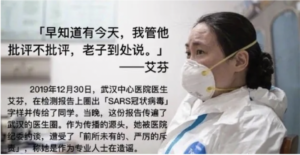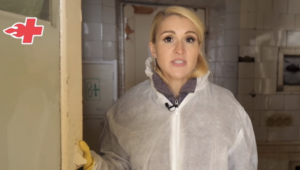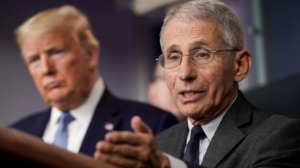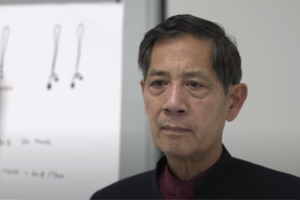24.04.2020
Covid 19 – Doctors under pressure: How some governments choose to fight dissent rather than disease
Pressure is mounting on physicians all over the world to fall in line or face the consequences
By Susanne Berger (Washington D.C.)
Interview with JOJJE OLSSON (@jojjeols), Swedish journalist and China expert, about Dr. Ai Fen
JOJJE OLSSON (@jojjeols) graduated in 2010 from the University of Hongkong with a master’s degree in journalism. He worked the next six years in Beijing, China. In 2016, he was blacklisted by the Chinese authorities and decided to relocate to Taiwan. Olsson regularly reports on Asian affairs for more than 100 Swedish and international publications, as well as through his popular and highly regarded blog “In Beijing” (www.inbeijing.se). He is the author of five books, several of which are used in Swedish school curricula.
DR. AI FEN (China)

Source: scienceintegritydigest.com
“Now we remember what extravagant happiness we enjoyed in the most ordinary life. I now feel that holding the baby, going out to play with him on a slide, or going out to watch a movie with my husband, even things we never did all that often in the past, they are now all a kind of happiness, an unattainable happiness.”
Dr. Ai Fen, Wuhan
In late December 2019, Dr. Ai Fen, head of the Emergency Department at the Central Hospital of Wuhan, was the first to share information with her colleagues about the presence of serious COVID-19/SARS infections in several of her patients. She advised her co-workers of the virulent nature of the virus and urged them to take extreme precautionary measures, including the wearing of a double layer of face shields, gowns and gloves. Among those who received Ai’s warning was the young ophthalmologist Dr. Li Wenliang. Li nevertheless soon contracted the virus after operating on an infected patient. When Dr. Ai posted her concerns on the popular Chinese messaging App WeChat, Dr. Li widely shared her warnings. He was subsequently detained and questioned by the Chinese Security services. At least seven of his colleagues were also later arrested. Dr. Li decided to continue to speak out and gave interviews from his hospital room, including to Western media. He died in early February, at age 34.
Dr. Ai – “the whistle giver” as she is known in China – has not been seen for nearly a month. In early March, Ai outlined efforts to silence her in a story published in the Chinese popular magazine Renwu (People). Even though Chinese authorities heavily censored the story, a complete version of it soon spread on social media. A few days later, a post appeared on Dr. Ai’s Weibo (Chinese Twitter) account: “Thank you for your care and love. I’m fine at the moment and I’m still working.” After an investigative Australian TV program (60 minutes Australia) aired a story about Dr. Ai’s disappearance, another mysterious post showed a picture of a road in Wuhan along with the caption, “A river. A bridge. A road. A clock chime.” And on April 1, a post read: “Happy April Fool’s Day,” showing Dr. Ai in a lab coat and mask, supposedly at work. Yet, nobody has been able to independently confirm her whereabouts. On April 2, a Swedish journalist was able to join a video conference call of several Chinese doctors from Wuhan and surrounding areas. Dr. Ai Fen was one of the participants, although her precise location remained unclear. In the video, she appeared to be sitting in a non-descript room, without any identifying marks, and her remarks were far less critical than they had been earlier. Almost two weeks later, on April 14, reporters for Radio Free Asia (RFA) were able to speak to Dr. Ai who said that she is well and that she continues to work at Wuhan hospital. She also told them that she was the author of the posts on her social media account. The reporters were unable to confirm Dr. Ai’s presence at Wuhan hospital, however.
In the earlier interview with Renwu, Dr. Ai emphasized that she felt only one regret – that she had not continued to speak out forcefully after she was reprimanded during a disciplinary review in early January.
“If I knew then what I know now, I wouldn’t care about the pressure (from my superior), and I would [expletive] speak everywhere, all right? (…) No one apologized to me at any time. I still feel that these events are an even clearer demonstration of why each person should stick to their own independent ideas, regardless, because if someone wants to stand up and tell the truth, there must be someone, and the world must hear a dissenting voice, right?”
Dr. Ai’s anger and frustration with the haphazard response by the Chinese authorities to the exploding public health crisis in Wuhan is widely shared, yet few people dare to speak out. Those who do, like the real estate tycoon Ren Zhiang, put themselves at grave risk. In a thinly veiled reference, Ren recently attacked Chinese leader Xi Jinping in a scathing essay, writing ” “I see not an emperor standing there exhibiting his ‘new clothes,’ but a clown who stripped naked and insisted on continuing to be an emperor.” Ren, too, has now disappeared.
Further reading
Science Integrity Digest, “Dr. Ai Fen, 艾芬, the Wuhan Whistle”
The Guardian, Coronavirus: “Wuhan doctor speaks out against authorities”
The China Times, “ESSAY BY MISSING PROPERTY TYCOON REN ZHIQIANG”
Reporter ohne Grenzen, Pressefreiheit in der Corona-Krise
DR. ANASTASIA VASILYEVA (Russia)

Source: Doctors’ Alliance, YouTube
“Access to information is a key aspect of the right to health. Everybody has the right to be informed about ongoing response efforts. The failure to guarantee this right undermines the public health response and puts everyone’s health at risk.”
Natalia Zviagina, Amnesty International’s Russia Director
On April 3rd, the news portal Meduza reported that Dr. Anastasia Vasilyeva, a well-known ophthalmologist and the head of the Russian medical workers’ union Allians Vrachy (Doctors’ Alliance @alyansvrachy) was arrested and beaten in the city of Okulovka (Novgorod region). Vasilyeva and her team were on a mission to deliver 500 respirators as well as personal protective equipment (PPE) to two local hospitals. Doctors’ Alliance is backed by the Russian opposition leader Aleksei Navalny.
According to a report by the advocacy group OVD-Info, on April 2nd plainclothes police officers beat and strangled Vasilyeva, allegedly for violating recently introduced emergency regulations, in particular section 19.3 of the Code of Administrative Offenses (disobeying the lawful instructions of police officers). Persons charged with this offense can be detained up to 48 hours without trial. Vasilyeva’s team was apparently accused of violating the quarantine rules in the area.
Dinar Idrisov, a human rights activist who witnessed the attack, says that Vasilyeva was punched in the chest and lost consciousness. An ambulance crew that was summoned was able to attend to Vasilyeva only briefly. The group was then taken to the police station. They were released at about 10:00 pm that evening. However, Dr. Vasilyeva was immediately re-arrested. She was finally allowed to leave 19 hours later, on April 3rd. After two court hearings she was ordered to pay a set of fines amounting to the equivalent of $20.
“It was not about the money for them, it was about breaking me” Dr. Vasilyeva said in a statement after her release. “But I am even more convinced that we are doing the right thing, and we will definitely keep on doing it.”
In late March, Dr. Vasilyeva had been summoned by Russia’s powerful Investigative Committee after her union began a public campaign to collect PPE for distribution to Russian hospitals. Vasilyeva had been a vocal critic of the severe PPE shortages and the Russian government’s decision to continue to send crucial medical supplies abroad. Dr. Vasilyeva also repeatedly warned that Russia’s health care system was woefully unprepared to deal with the complex and widespread effects of Corona virus infections.
Natalia Zviagina, Amnesty International’s Russia Director, sharply condemned Vasilyeva’s detention. “It is staggering that the Russian authorities appear to fear criticism more than the deadly COVID-19 pandemic. By putting her behind bars they expose their true motive – they are willing to punish health professionals who dare contradict the official Russian narrative and expose flaws in the public health system.”
Further reading
The Moscow Times, “meet-the-activist-doctor-who-has-become-the-kremlins-loudest-coronavirus-critic”
PROF. DR. ANTHONY FAUCI – DR. ROBERT REDFIELD – DR. RICK BRIGHT (USA)

Source: nationalreview.com
“You don’t make the timeline. The virus makes the timeline.”
Dr. Anthony Fauci, Washington, D.C.
At age 79, Dr. Anthony Fauci, a leading immunologist and the Director of the National Institute of Allergy and Infectious Diseases, is one of the most experienced public health experts in the world. For more than 40 years he has guided the U.S. through a series of global health crises, including the HIV-Aids epidemic of the late 1980s, as well as the more recent Ebola and Zica virus outbreaks. As a current member of the U.S. federal government’s Corona Virus Task Force, he has become once again “America’s Doctor”, as The New Yorker magazine put it in a recent profile – a steady, calming presence in daily briefings, delivering sober and often brutally honest facts.
For the White House Press Corps and the public watching at home, Fauci explains, expands on and sometimes corrects the many misleading statements made by President Trump and other U.S. government officials, often in real time. This honesty may soon cost him his job. Behind the scenes Fauci has reportedly frequently clashed with several key members of the Trump administration, especially Peter Navarro, Special Advisor for Trade and Manufacturing Policy. Fauci has made it clear that he strenuously objects to the public promotion of questionable treatments and medications in the fight against COVID 19, such as hydroxychloroquine, a drug used to treat lupus, malaria and similar illnesses. Fauci and his colleagues have repeatedly warned that the medication’s efficacy in treating COVID 19 is uncertain and requires additional testing. Dr. Fauci’s concerns appear to have been warranted: On April 24th, the U.S. Food and Drug Administration (FDA) issued an urgent warning about the use of the drug due to potentially serious cardiac side effects.
In his public remarks, Fauci has been circumspect but unfailingly clear. When President Trump announced that he hoped to restart the U.S. economy by Easter (April 12), Fauci pointed out that this was simply an “aspirational date” – with the President standing just a few feet away. Confronted with data projections that indicated the possibility of hundreds of thousands of deaths if social distancing rules were suspended too quickly, Trump eventually backed down. But he clearly did not like it. Neither did Trump’s most ardent followers who verbally attacked and even physically threatened Fauci on Twitter and other social media for daring to contradict the President. The situation became so serious that the FBI decided to assign Fauci a personal protective detail.
But this has not stopped Fauci from speaking out. When asked over the Easter weekend to comment whether or not the U.S. should have been better prepared for the current crisis, Fauci did not hold back: “I mean, obviously, you could logically say that if you had a process that was ongoing and you started mitigation earlier, you could have saved lives,” Fauci said in an interview on CNN. This prompted President Trump to re-tweet to his 78 Million Twitter followers a message from a Republican Party loyalist who was calling for Fauci’s dismissal – “Time to #FireFauci…”
So far, Fauci seems undeterred. His focus is on creating a safe way to open up the U.S. economy while ensuring that peoples’ lives are not put in additional danger. “We look at it from a pure health standpoint,” Fauci explained. “We make a recommendation. Often, the recommendation is taken. Sometimes, it’s not. But (…) it is what it is. (…) That’s a consequence that you have to balance. The attempt to save as many lives as you can.”
Several other U.S. scientists and doctors have come under pressure as well. When Robert Redfield, director of the American Center for Disease Control (CDC) warned in an interview with the Washington Post on April 21 that the next wave of Corona Virus infections expected in the autumn could be even “more difficult” than the current one, President Trump complained in a Tweet the next morning that Redfield had been “totally misquoted”. Redfield held his ground, however. During a White House briefing later that day Redfield clarified his remarks to say that the added problems of the flu and influenza would make coping with the Corona virus during the fall and winter “even more difficult”. Still, he added that he had been quoted accurately by the Washington Post reporter.
That same day, Dr. Rick Bright who held a key position in the Trump Administration’s official pandemic response, claimed in an interview with the New York Times that he had been dismissed because of his refusal to endorse questionable medications and treatments for the Corona Virus advocated by President Trump. “Specifically, and contrary to misguided directives, I limited the broad use of chloroquine and hydroxychloroquine, promoted by the administration as a panacea, but which clearly lack scientific merit,” Bright told the paper. Bright who had served as the former director of the federal health department’s Biomedical Advanced Research and Development Authority (Barda), and as the deputy assistant secretary for preparedness and response, has been reassigned to a position in the National Institute of Health (NIH). Bright announced that he will file a formal whistleblower complaint. “I am speaking out because to combat this deadly virus, science — not politics or cronyism — has to lead the way.
Further Reading
The New Yorker, “How Anthony Fauci became Americas Doctor”
Der Spiegel, “anthony-fauci-vs-donald-trump-das-corona-orakel”
SUCHARIT BHAKDI (Germany)

Source: https://www.youtube.com/watch?v=UxaAgqBtn7A
“As Emeritus Professor of the Johannes-Gutenberg-University in Mainz and longtime director of the Institute for Medical Microbiology, I feel obliged to critically question the far-reaching restrictions on public life that we are currently taking on ourselves in order to reduce the spread of the COVID-19 virus.”
Prof. Dr. Sucharit Bhakdi
The discussion how to most effectively counter the spread of Covid-19 infections continues in Germany as well, but with a slightly different focus. Scientists and legal experts are locked in an increasingly heated debate whether the drastic measures taken to fight the pandemic are truly justified and defensible, on medical, legal and social grounds. Critical and controversial voices like that of Professor Sucharit Bhakdi, the retired head of the Institute of Medical Microbiology and Hygiene at the University of Mainz, have so far reached only a limited audience. At the end of March, Bhakdi addressed an open letter to German Chancellor Angela Merkel in which he asked her to provide answers to a set of specific questions concerning the nature and official handling of the Corona Virus outbreak. As of now, the Chancellor’s office has not issued a formal response to Professor Bhakdi’s inquiry. Critics of Mr. Bhakdi point to the fact that his questioning of the dangers of Covid-19 infections rests in part on large gaps in reliable scientific data. Other experts argue that while the gaps are real, they do not in and of themselves justify a less stringent approach to the pandemic.
Meanwhile, legal experts are raising the alarm about the long-term effects of the government interfering in the lives of private citizens to such a serious degree. In a recent essay published in the German magazine Ossietzky, Rolf Gössner, a prominent German attorney and former President of the International League for Human Rights (Internationale Liga für Menschenrechte), criticized what he calls the lack of transparency and the limitations of the current scientific debate. He also warned about the potentially serious and lasting consequences of the drastic curtailing of civil rights and liberties enacted by both federal and local German authorities in response to the crisis. In addition, Gössner has drawn attention to the disastrous human rights situation in refugee camps in Greece and has called for their immediate closure.
For further reading
Offener Brief von Professor Sucharit Bhakdi an die deutsche Bundeskanzlerin Angela Merkel
Letter by Prof. Dr. Sucharit Bhakdi to Chancellor Dr. Angela Merkel
Computer und Netz, “Video im Faktencheck”
Rechtsanwalt Rolf Gössners Artikel in der Zeitschrift Ossietzky
Appell des Republikanischen Anwältinnen- und Anwältevereins zur Auflösung der Flüchtlingslager
Your support
If you wish to support dissidents and critical public debate, please share this article and their plight with friends and contacts on Twitter, Facebook, Instagram and other social media. Contact journalists, politicians, diplomats and other official representatives and express your concern. And support our project and the work of other human rights organizations.






